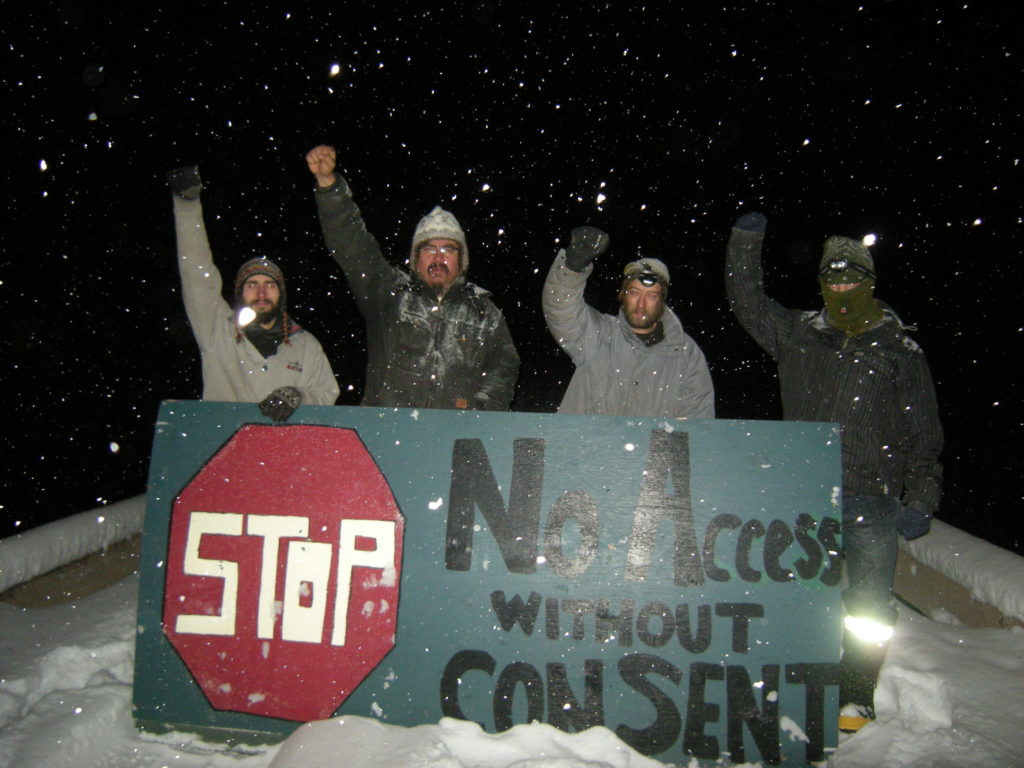On March 12, the Unist’ot’en Camp released a statement that read in part: “CGL has been escorted in by BC RCMP every day to destroy our unceded territories. The necessary permits have NOT been approved. Our matriarchs were removed at gunpoint to make way for industry to bring in these pipes. This is a blatant act of genocide.”
This article was originally published by The Conversation under a Creative Commons license on March 10. Read the original article here.
As the RCMP continue to enforce an injunction in favour of the proposed Coastal GasLink Pipeline, it’s important to ask questions about whose capital is being secured by the ongoing police presence in Wet’suwet’en territories.
The purpose of the pipeline is to produce and accelerate value for investors as it moves gas to export markets.
The Coastal GasLink pipeline and the related exploitation of the Western Sedimentary Basin that will feed it exist to generate interest income on investments, dividends for shareholders and to otherwise grow the value of the capital invested. The basin encompasses southwestern Manitoba, southern Saskatchewan, Alberta, northeastern British Columbia and the southwest corner of the Northwest Territories.

The past 20 years of pension securitization in Canada have meant that the retirement savings of Canadian workers have become increasingly dependent on the market value of oil and gas infrastructure, publicly traded oil and gas equities and securities, and the success of the resource economies that sustain them.
It also means income security for working Canadians is increasingly dependent on the underlying conditions that make these assets valuable — including the militarized police repression of Indigenous jurisdiction.
AIMCo bought large interest in pipeline
On the eve of the British Columbia Superior Court injunction against the Wet’suwet’en First Nation Hereditary Chiefs in favour of Coastal GasLink in late 2019, AIMCo (the Alberta Investment Management Corporation), one of Canada’s largest institutional investment fund managers, purchased a 65 per cent equity interest, alongside global equity investor KKR, in the pipeline from TC Energy, previously Trans Canada.
AIMCo manages funds on behalf of several of Alberta’s large public sector pension plans, including the Special Forces, Public Service and Local Authorities pension plans. It will soon manage the nearly $60 billion Alberta Teachers Retirement Fund.
It also manages the investment of government funds, including general revenues, used for education, health care, infrastructure and social programs for Albertans.
British Columbia Investment (BCI) manages B.C.’s large public sector pension funds, including the B.C. Teachers and Public Service pensions.
It has considerable exposure to LNG, including to all five members (Royal Dutch Shell, Petronas, Petro China, Mitsubishi and Korea Gas) of the $40 billion dollar consortium LNG Canada, which owns the terminal intended to liquefy, store and export gas transported by the Coastal GasLink pipeline.
Billions invested
The consortium is also backing the pipeline’s construction with up-front cash from recently signed, 25-year transportation service agreements. According to its December 2019 inventory of public equity holdings, BCI has well over a billion dollars of equity invested in Canada’s top Western Sedimentary gas producers, including Canadian Natural Resources, Tourmaline, Encana, Cenovus, Seven Generations Energy, Prairie Sky, Arc and Fortis.
The Caisse de dépôt et placement du Québec (CDPQ) has billions of dollars of exposure to gas companies with interests in the Western Sedimentary Basin and supporting LNG infrastructure. According to its most recent statement of holdings, these include: Alta Gas ($291 million), Canadian Natural Resources ($479 million), Cenovus ($217 million), Seven Generations, Storm, Tourmaline and Chevron, and more than $600 million invested in TC Energy, which retains a 35 per cent controlling interest in Coastal GasLink.
These records indicate that as of December 2018, the CDPQ had considerable exposure to LNG Canada Consortium members Korea Gas, Petronas and Royal Dutch Shell.
According to its most recent disclosure of publicly traded equities and of real asset investments, the Canada Pension Plan Investment Board (CPPIB), which manages the retirement savings of millions of Canadians, has billions invested in natural gas companies operating in the basin.In Ontario, the Teachers Pension owns outright HRG Royalty, a $3.3 billion dollar subsidiary of Chevron that holds fee simple oil and gas titles and royalty interests in the basin. A fee simple represents absolute ownership of land, and therefore owners can do whatever they like with it.
More than $1.5 billion is invested in Canadian Natural Resources, Seven Generations Energy and Black Swan alone. CPPIB also has more than $200 million invested in TC Energy.
Investing in colonialism
What does this mean? To grow retirement savings in pipelines and LNG terminals is to literally invest in colonialism.
The social reality of this moment of so-called reconciliation is therefore one in which we are actually deepening, at the dizzying speed of capital markets, workers’ personal and economic stakes in the extension and expansion of Indigenous dispossession.
This means that the interests of settler workers and corporate capital are increasingly aligned against Indigenous rights and jurisdiction.
This is a deeply structural form of racialized oppression; one that accounts for how value accrues through financial transactions that are based on Indigenous dispossession and the systemic denial of Indigenous rights.
The flip side of this, of course, is that the income security of working Canadians is deeply exposed to the financial liabilities of settler colonialism, since the value of income invested in LNG far exceeds what it’s actually worth when Wet’suwet’en and other Indigenous title-holders successfully defend their rights.
That means that as Indigenous peoples become increasingly successful at defending their lands, pension funds will be left sitting on a huge pile of stranded assets.
Author Bio:
Anna Stanley is Assistant Professor in the Department of Geography, Environment and Geomatics at the University of Guelph.
